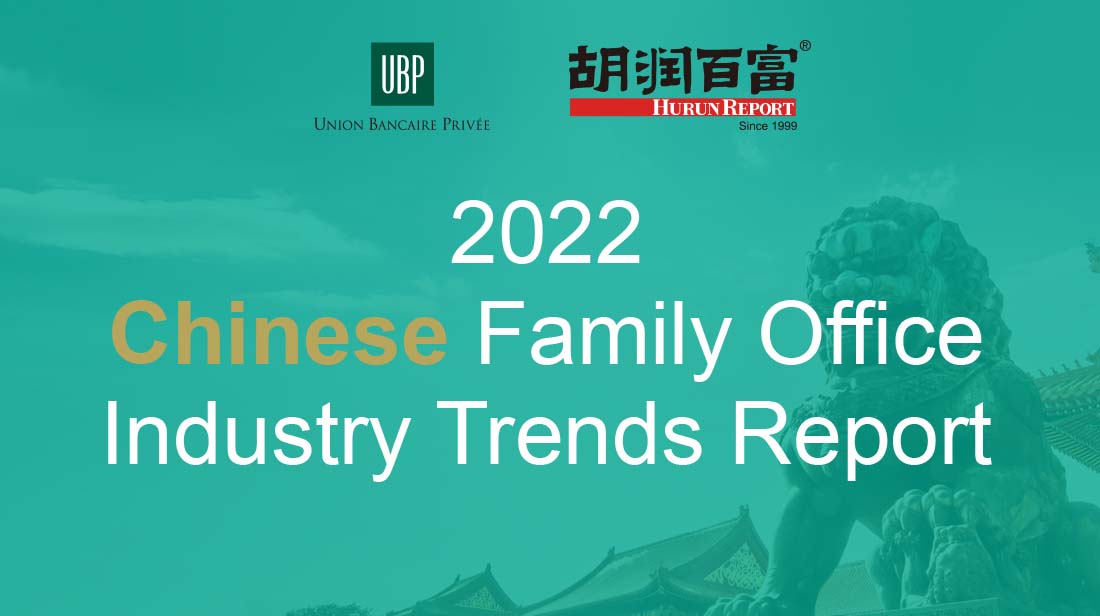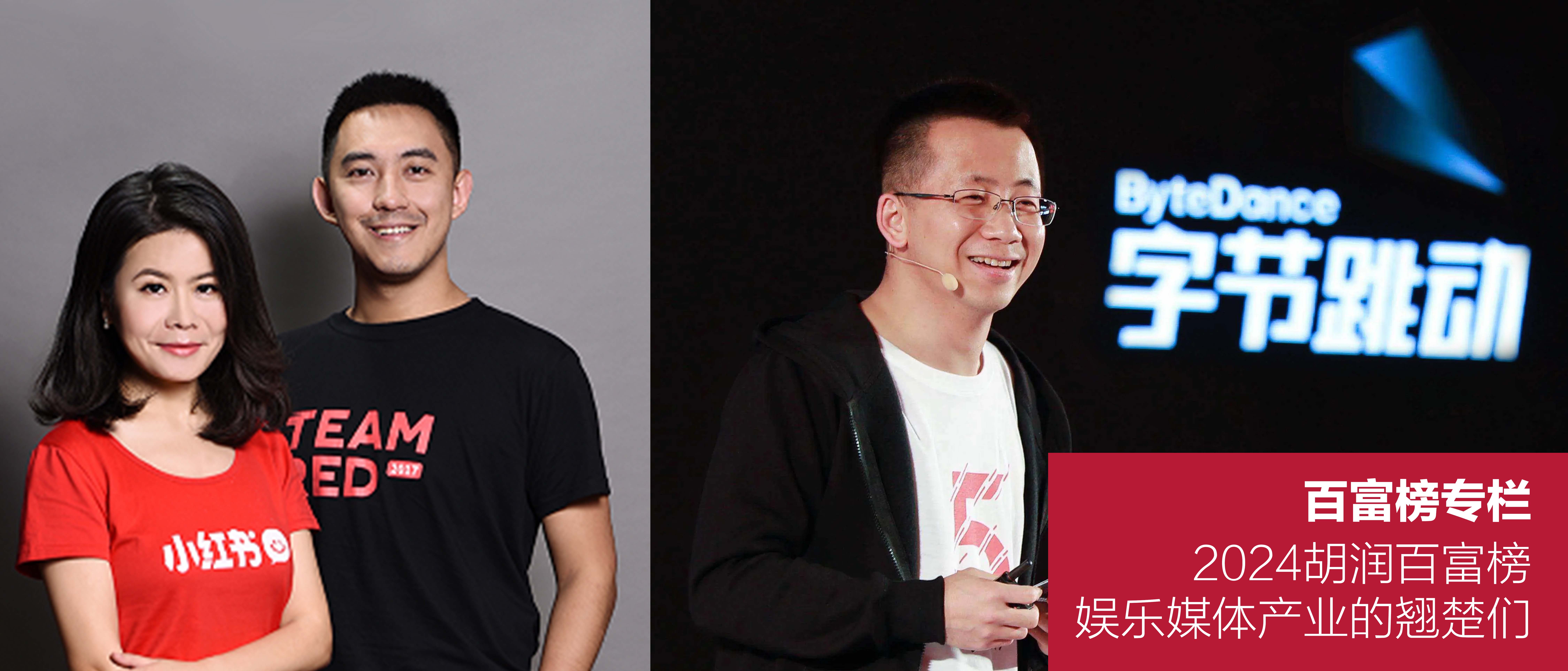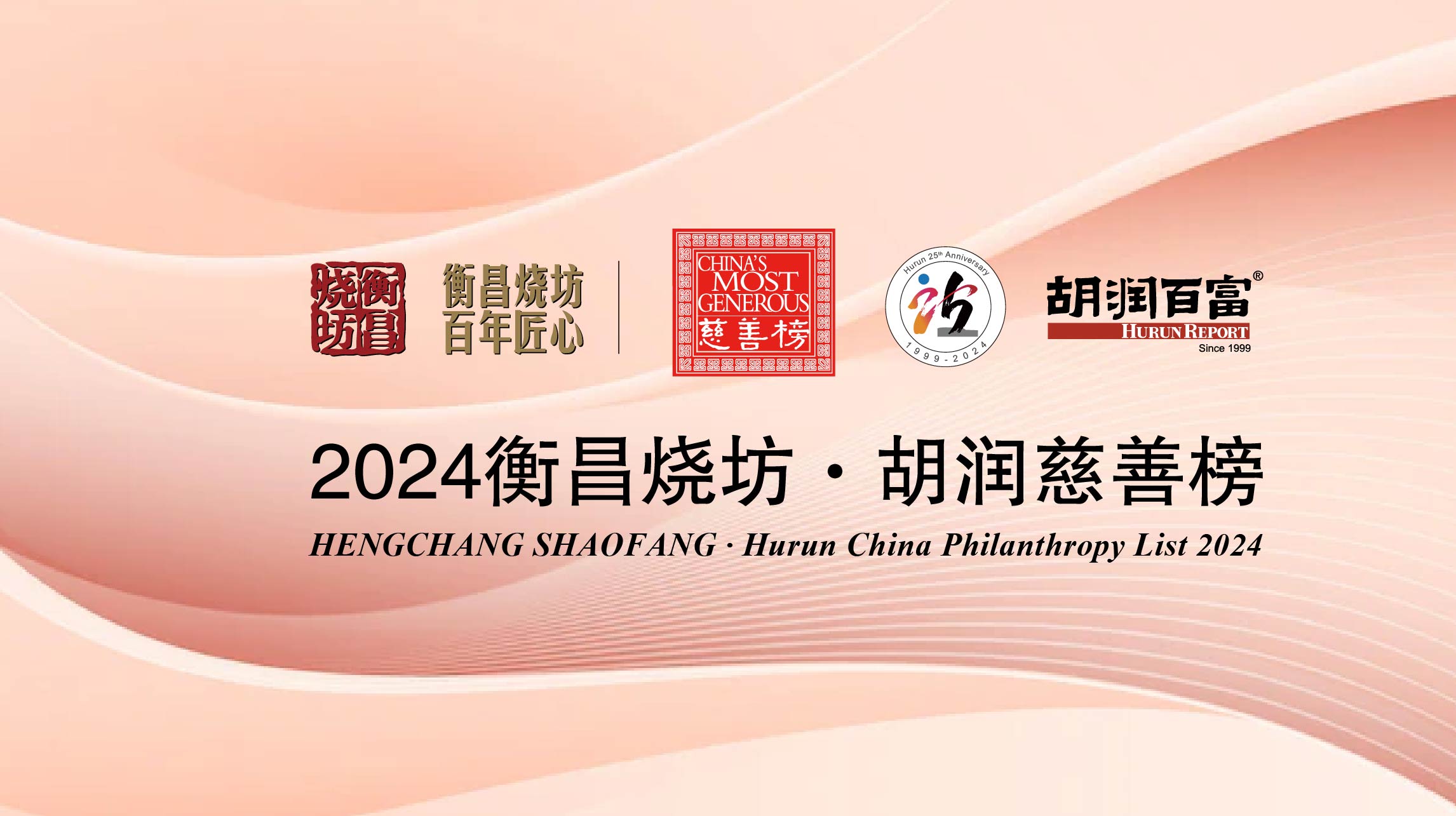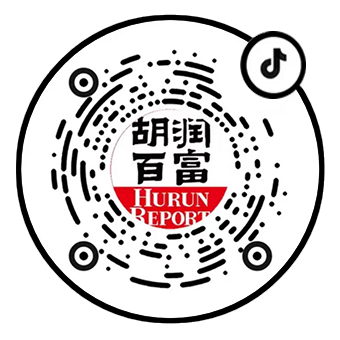2022 Chinese Family Office Industry Trends Report
Union Bancaire Privée (UBP), a leading Swiss private bank with a strong and growing presence in Asia, and Hurun Research Institute, a renowned authority on research into wealth creation, today jointly released the 2022 Chinese Family Office Industry Trends Report.
UBP and Hurun Research Institute jointly release the 2022 Chinese Family Office Industry Trends Report
The report defines the concept of ‘Chinese Family Office’ for the first time

Shanghai, Dec 8, 2022 – Union Bancaire Privée (UBP), a leading Swiss private bank with a strong and growing presence in Asia, and Hurun Research Institute, a renowned authority on research into wealth creation, today jointly released the 2022 Chinese Family Office Industry Trends Report.
Focusing on the current role for family offices in China and based on detailed industry analysis and research into the Chinese Family Office, the 72-page report defines the concept of ‘Chinese Family Office’ for the first time and provides an in-depth analysis covering the following four key areas:
1. What is the value of a family office?
2. Why are Chinese Family Offices needed?
3. What are the characteristics of a Chinese Family Office?
4. What is their future?
Key Takeaways
- When considering management of their wealth, 83% of ultra-high net worth families have ‘family wealth inheritance’ as their top goal, followed by ‘financial security’ (74%).
- 82% of respondents (Chinese family office founders interviewed in this study) identified ‘wealth planning’ as a core competency required for family offices looking after UHNWI Chinese, followed by asset planning (55%) and professional advisory services (36%).
- In terms of wealth planning, 96% of family offices supporting UHNWI Chinese provide ‘family wealth inheritance’ services, with ‘family governance’ (70%) ranked second and philanthropy management’ (65%) ranked third.
- In terms of professional consulting, ‘tax law consulting’ (83%), ‘family member education’ (74%) and ‘risk management’ (43%) are core services.
- Intergrated services, ESG investments, focusing more on creating positive social impact, and the future cooperation ecosystem are considered as the four key development directions worth paying attention to in the future.
- Hard tech (71%), driven by new energy and AI, and healthcare (67%), led by medical products and healthcare consulting services, are considered as two of the most compelling sectors for investment.
China’s Long History of the “Family Office” Concept
The idea of a ‘family office’ is well-established in China. In the Spring & Autumn period of China’s early history and the Warring States period more than 2500 years ago, the profession of ‘Jia Zai’contained the core of a family office framework. The report presents the concept of ‘Chinese Family Offices’ for the first time and reveals its ancient origins. What distinguishes Chinese Family Offices from family offices in more mature markets is that the ideas governing how to run them are rooted in Chinese culture especially around family dynamics. Over time, family offices have adapted to the regulatory characteristics of the Chinese market, to serve local entrepreneurs. They combine the business principles of mature Western family offices with the central Chinese characteristics of protecting family wealth and managing businesses in accordance with traditional family values and structures.
With China's reform and opening up more than 40 years ago and its accession to the WTO 20 years later, China's private wealth has grown rapidly and is now passing from the first to the second generation. The market size is now huge. UHNW families in China, defined as households with more than CNY 100 million (equivalent to US$16mn) of total wealth, reached 133,000 households, according to the Hurun China Wealth Report 2021. The number of ‘international ultra high net worth families’ in China, defined as households with the equivalent of US$30mn, hit 89,000 households. The total wealth of affluent families in China topped CNY 160 trillion, of which, CNY 49 trillion is investable wealth. It is estimated that CNY18tn (US$3tn) of wealth will pass to the next generation within ten years, CNY49tn (US$8tn) within 20 years and CNY92tn (US$15tn) within 30 years.
Michael Blake, UBP’s Asia CEO, said:” UBP is delighted to collaborate with Hurun Research Institute in producing the 2022 Chinese Family Office Industry Trends Report. As a leading private bank and a longstanding family office advisor in Switzerland, we have a strong track record in advising our clients on the establishment, operation and evolution of family offices. This report, which combines our global domain expertise with Hurun’s knowledge of China’s family office landscape, seeks to provide new insights for entrepreneurial families in China and their family office leadership teams.”
Rupert Hoogewerf, Chairman and Chief Researcher of Hurun Report, said: “China is on the cusp of a wealth management boom. It is my pleasure to release the 2022 Chinese Family Office Industry Trends Report jointly with UBP, a leading Swiss private bank, to review the past, present and future of Chinese Family Offices. I hope this report can help more people understand the services of Chinese Family Offices, explore the real value offered by Chinese Family Offices and identify how to help Chinese ultra-high net worth families to build productive and stable structures to protect and grow their wealth. To do this successfully requires being alert to emerging wealth trends and always looking to balance sustainable development between the individual, family and society.”
Core Findings
1. What is the value of a family office? – The embodiment of the family office is as the family gatekeeper, and its intrinsic value lies in protecting wealth over time while remaining committed to social values.
Family gatekeeper: Takes family needs as the core. The main function of the family office is to govern and manage the tangible assets (wealth and family business) and intangible assets (human capital and social capital) of the family. Industry experts believe that the family office has to work effectively across four dimensions: family wealth management, family business management, family member management and the protection of family values and traditions.
Time value: The deeper meaning is reflected in the sustainable development of the family. Family offices help families maintain resilience and vitality in a changing external environment and contribute to their sustainable development. Compared with the tangible assets of the family, the intangible assets of the family are the key elements of sustainable development, and the family spirit and social influence can best reflect the time value over the long term.
Social value: Building family traditions is also one of the core functions of family offices, including establishing family philanthropic funds and managing charitable activities. The provision of a high-quality service via a family office helps entrepreneurs' tangible and intangible assets to be managed effectively and protected for the benefit of future generations. Having the security of knowing that there is a proper structure in place will build long-term confidence around the sustainability of the family’s wealth. This will create space to free the entrepreneurial spirit, promote the positive cycle of wealth creation and social prosperity and add greater value in the high-quality development of society.
2. Why are Chinese Family Offices needed? – Exploring the development momentum behind the creation of Chinese Family Offices
With private wealth growing rapidly in China and in the process of being passed down from the first generation to the second, the most pressing need is for ‘top-level design’ to identify the core function of each Chinese Family Offices office. ‘Wealth inheritance’ (83%) and ‘wealth security’ (74%) are the important goals of UHNW families when evaluating the management of their wealth. Chinese Family Offices have already played an integral role in helping entrepreneurs to manage their family business and the associated wealth.
The primary goal of UHNW families in arranging their wealth management is to secure the inheritance of the next generation and those who will follow. This priority can boost the desire to have significant levels of wealth managed by a Chinese Family Office. The main appeal for UHNW families in setting up and using Chinese Family Offices is ‘wealth inheritance’ (83%), followed by ‘risk management’ (75%), ‘global resource allocation’ (58%), ‘developing investment strategies and seeking investment tools’ (58%), and ‘nurturing the next generation of the family’ (42%).
3. What are the characteristics of a Chinese Family Office? – The Chinese Family Office concept is still not fully developed and will not reach full maturity for some time. Currently, there is a split in family offices between non-commercial and commercial types.
Non-commercial family offices are divided into internal (which exist within the family business, also known as "virtual") and external (established separately outside the family business) types, which are generally initiated and set up by the family itself. There are two types of non-commercial family offices according to the service content involved: investment only and total-solution.
Commercial family offices, Initiated and established by financial institutions, independent asset manager, professional managers etc., operate independently outside the family business and primarily serve multiple family clients, can be divided into three types according to the services they provide: total-solution (with top-level design capability), financial (providing investment or asset management services), and non-financial (providing professional services such as tax law). At present, barriers to the success of non-commercial family offices in China are perceptions around cost, trust and the extent to which ultra-high net worth families see family offices as essential. Commercial family offices are more common in the Chinese Family Offices space.
82% of respondents (Chinese family office founders interviewed in this study) identified ‘wealth planning’ as a core competency required for family offices looking after UHNWI Chinese, followed by asset planning (55%) and professional advisory services (36%).
Wealth planning: According to the survey data, ‘family wealth inheritance’ is the core service currently expected from Chinese Family Offices, and 96% of them have already implemented such services. Family governance (70%) came in second, and charity management (65%) was third.
Asset planning: At present, the business capabilities and associated advantages of Chinese Family Offices are still largely in China. The asset allocation types show diversified characteristics, including equities, fixed income, private equity, hedge funds and so on. Among them, equities (95%), private equity and family trusts (81%) are the focus of Chinese Family Offices, followed by fixed income, hedge funds and insurance (76%).
Professional consulting services: In terms of non-financial services, ‘tax law consulting’ (83%), ‘family member education’ (74%) and ‘risk management’ (43%) are the core services provided by Chinese Family Offices.
4. What about the future? – There is real scope to reshape the value and status of Chinese Family Offices. This will involve embracing the Chinese Family Offices industry with an open and cooperative attitude, and working to ensure collaboration among the specialists and experts who provide critical advice and support. With the adoption of global best practice, there is real potential for the high-quality development of Chinese Family Offices and the promotion of a positive cycle of value creation.
The report summarises the following four directions for the future development of Chinese Family Offices: (1) Integrated service: as services evolve, the demand for the best of global ideas is tangible; (2) ESG investment: help the sustainable development of the family; (3) Focusing more on creating social impact: shaping and applying the family's social values; (4) Future cooperation ecosystem: building transparent relationships to deliver mutual benefit for Chinese family offices and their chosen external partners.
The future investment direction reveals optimism around investment megatrends such as hard technology and healthcare. It is also important for many families to incorporate ESG aspects into their investment strategy and values. According to the survey data, hard technology (71%) and healthcare (67%) are the two most attractive investment sectors. In the hard technology sector, industry insiders are most optimistic about investments in industries such as new energy (87%) and AI (80%). The healthcare industry continues to be perceived as growing with optimism around areas such as medical products (64%), health management and consulting (64%), and medical/healthcare devices (57%).
end
Notes to editors
About the Research Methodology
The research methodology covers desk research and special research. First of all, the project team fully mined the research results of Hurun Research over 20 years and explored the trends of China's private wealth by relying on the Hurun Report 3000+ list-level entrepreneur database. In terms of specific research methodology, the project team adopted a combination of quantitative and qualitative research methods to ensure the depth and breadth of the research. The project team invited more than 30 founders of Chinese Family Offices to conduct qualitative interviews and quantitative investigations, and obtained abundant first-hand information, based on which the output of viewpoints with research value and significance was formed. Meanwhile, the project team invited family office industry experts from mature markets such as Switzerland and Singapore to share their successful experiences.
About UBP
UBP is one of Switzerland’s leading private banks, and is amongst the best-capitalised, with a Tier 1 ratio of 23.2%. The Bank specialises in the field of wealth management for both private and institutional clients. It is based in Geneva and employs 1,985 people in over twenty locations worldwide, and holds CHF 148.2 billion in assets under management (all figures as at 30 June 2022).
About Hurun Inc.
Promoting Entrepreneurship Through Lists and Research
Oxford, Shanghai, Mumbai, Sydney, Paris
Established in the UK in 1999, Hurun is a research, media and investments group, promoting entrepreneurship through its lists and research. Widely regarded as an opinion-leader in the world of business, Hurun generated 8 billion views on the Hurun brand last year, mainly in China and India.
Best-known today for the Hurun Rich Index series, telling the stories of the world’s successful entrepreneurs in China, India and the world, Hurun’s two other key series include the Hurun Start-up series and the Hurun 500 series, a ranking of the world’s most valuable companies.
The Hurun Start-up series begins with the Hurun U30s, an awards recognizing the most successful entrepreneurs under the age of thirty, and is today in seven countries. Next up are Hurun Cheetahs, Chinese and Indian start-ups with a valuation of between US$300mn to US$500mn, most likely to go unicorn with five years. Hurun Global Gazelles recognize start-ups with a valuation of US$500mn to US$1bn, most likely to go unicorn within three years. The culmination of the start-up series is the Hurun Global Unicorn Index.
Other lists include the Hurun Philanthropy Index, ranking the biggest philanthropists, the Hurun Art Index, ranking the world’s most successful artists alive today, etc…
Hurun provides research reports co-branded with some of the world’s leading financial insitutions, real estate developers and regional governments.
Hurun hosted high-profile events in the last couple of years across China and India, as well as in London, Paris, New York, LA, Sydney, Luxembourg, Istanbul, Dubai and Singapore.
For further information, see www.hurun.net.
For media inquiries, please contact:
UBP
Jennifer Ran
Media Relations Manager, Asia
Tel: +852 37019716
Email: jennifer.ran@ubp.com
Hurun Report
Porsha Pan
Tel: +86-21-50105808*601
Mobile: +86-139 1838 7446
Email: porsha.pan@hurun.net
Grace Liu
Tel: +86-21-50105808
Mobile: +86 136 7195 4611
Email: grace.liu@hurun.net
-

Over 3,000 New Hires! Tencent's Financial Report Signals Optimism
2024-11-22
-

Musk Bets on Trump, Tesla Stock Soars, Adding 150 Billion to His Wealth in a Day
2024-11-20
-

Beyond TikTok: Lemon8’s Rapid Growth in the U.S. Market
2024-11-14
-

A New King of Wealth in China: How Short Videos Are Redefining Business Models
2024-11-14
-

Hurun China Philanthropy List 2024
2024-11-12



